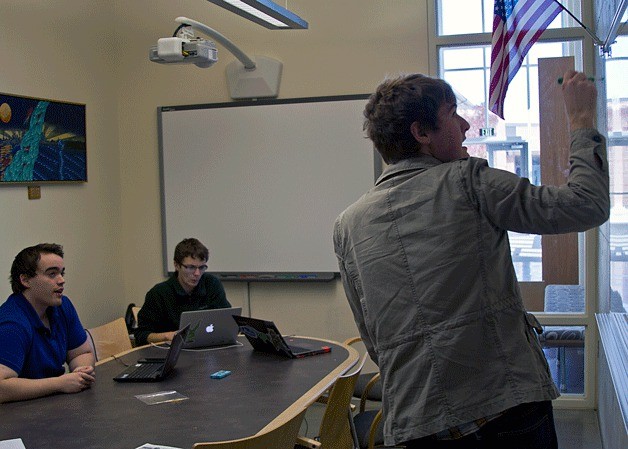The members of the Bainbridge High School debate team speak their own language.
“What is the criterion of your resolution?”
“Within what framework does it function?”
“If we don’t know what truth is then we are forced to seek it.”
It doesn’t take too much of that kind of talk for an outsider to quickly realize there is much more to competitive debating than just arguing.
“The interests aren’t the same as a regular argument,” said team co-captain James Maltman.
It’s true that structured, competitive debating requires more than just firmly held opinions.
“To argue you only need to see part of the picture,” said Head Coach Jordan Hudgens. “Whereas debating requires you to see the whole picture or to find new pictures entirely.”
This year, despite a smaller-than-normal team made up primarily of novice players, Hudgens says that team morale is good and the players have their sights set on higher level competition.
“I’m very optimistic for our team,” he said. “I hope to clear at least one of them to the Tournament of Champions this year. We’ve always had a small, closely knit team, but we lost 80 percent of the team to graduation a couple of years back. Since then, we’ve built a promising novice squad into a strong debate team.”
The team’s primary focus this year is on the Lincoln-Douglas (LD) form of debate. This traditional one-on-one form of structured debate is named after the historic debates between Abraham Lincoln and Stephen Douglas on the subject of the morality of slavery, and LD debates often rely on logic and morality to prove or disprove a topic statement known as a resolution.
The team authors resolutions for competition and must then be prepared to offer arguments for and against them without knowing in advance which side they will have to represent.
“Switch-sides debate recognizes that both sides of an issue have valid points, leaving the task of the debater to discover ways to crush arguments they would strongly believe in,” Hudgens said. “Bainbridge has always been a fearsome name on the Washington State Lincoln-Douglas circuit, and we certainly intend to stay that way.”
The research process for each resolution is extensive, and requires the students to thoroughly know and understand every aspect of the issue they hope to argue. Many veteran team members become attached to certain projects and the effort they have put into solidifying their resolutions.
“When you write a case you put some of yourself into it,” said team co-captain Jacob Reiter. “So when you can’t run it, or when you don’t get a chance to run it, you feel sad.”
Currently the senior members of the team are authoring a resolution that states that, “In the U.S. Court Justice System, truth seeking ought to take precedence over attorney-client privilege.”
Like more traditional athletic competitions, practice makes perfect in the world of debate.
“Good debaters spend a lot of time doing drills and preparing responses to expected arguments,” Hudgens said. “Great debaters read extremely dense literature and philosophy, are constantly reworking positions and work on an overall game. Not just arguing, but speech events as well.”
Indeed the world of competitive debate offers a variety of events outside of the traditional LD format including mock congress, extemporaneous speech as well as dramatic and humorous interpretation events which play out more like theatre performances than speeches.
Unfortunately for debaters, unlike traditional points-based physical contests, judging of a speech event varies depending on the taste of each judge. This makes it very difficult for debaters to anticipate how they will fare in a given competition. The more researched and better prepared debater may be outmatched simply because an opponent is more charismatic or confident and gives the judges a better overall impression.
“Judging can be very subjective,” Hudgens said. “Debate is a combination of style and substance, and in order to succeed you really have to develop both skill sets.”
Hudgens added that the benefits of involvement with an activity like debate are numerous and will be beneficial for students long after they leave high school.
“Most people say that colleges like to see extracurriculars on an application,” Hudgens said.
“And debate is certainly a strong option for that,” he said. “But I like to focus on the tangibles. Debate demands attention to detail and strong reading and writing skills. Not to mention, obviously, public speaking skills. Students come out of debate feeling more confident, outgoing and expressive. Classroom environments aren’t usually conducive to learning to speak well, and practicing it in an open, relatively low-pressure environment can be extremely valuable.”



